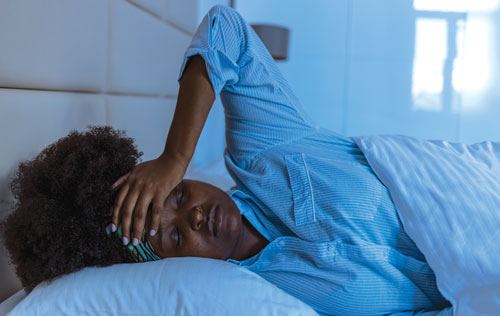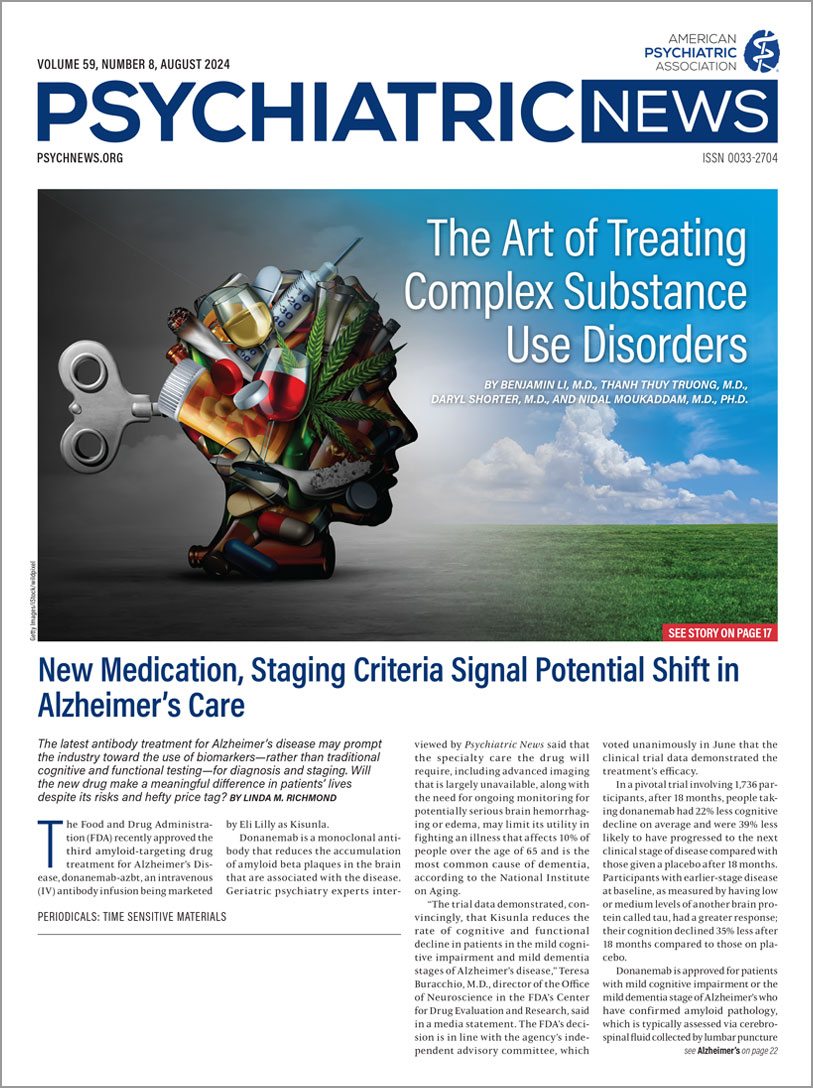Sleep-focused non-pharmacologic treatment for insomnia can reduce the risk of suicide in both military veterans and civilians, according to research findings reported at the annual meeting of the American Academy of Sleep Medicine and Sleep Research Society in Houston in June.
People with suicidal ideation report insomnia, nightmares, and variable sleep timing more frequently than people without such thoughts, Rebecca Bernert, Ph.D., founder of the Stanford Suicide Prevention Research Laboratory, said at a symposium on sleep, psychiatric disorders, and suicidality. Poor sleep is a newly recognized risk factor for suicidal ideation, suicide attempts, and death by suicide, she noted. Connecting people at risk for suicide with treatment remains a critical challenge, said Bernert, who is also an assistant professor of psychiatry and behavioral sciences at the Stanford University School of Medicine. Fears of involuntary hospitalization, perceived stigma, and workplace or social repercussions often deter people from seeking help for mental health issues.
Further, selective treatments for suicide prevention remain scarce and mismatched to the acute timing of a suicidal crisis, she said.
By comparison, brief conversations to address sleep concerns can help people sleep better within days and lift their moods, Bernert told Psychiatric News. “That makes sleep a novel and highly promising treatment target for suicide prevention,” she said. People also view poor sleep as an important, non-stigmatizing medical issue that warrants treatment.
“Suicide rates have surged in recent years among veterans, who die by suicide at elevated rates relative to the general population,” she noted. “We urgently need more effective and widely available prevention strategies.”
Bernert led two teams of researchers at the Stanford University School of Medicine and the VA Palo Alto Health Care System in developing and testing brief behavioral sleep interventions tailored to military and civilian community populations, respectively. The researchers used state-of-the-art risk monitoring to ensure participant safety across both studies.
In the military study, Project SERVE (Sleep Enhancement for Returning Veterans), the research team enrolled 77 veterans who had served in Afghanistan, Iraq, and as far back as Vietnam. Participants ranged from 23 to 74 years old, with a mean age of 45 years. The group was 85% male, 57% White, and the rest other ethnicities. All participants qualified for clinically significant sleep disturbance and either DSM-5-defined depression or current suicidal ideation.
The researchers randomized half to receive four 90-minute, weekly in-person sessions of an active treatment, Cognitive Behavioral Therapy for Insomnia (CBTi) along with Imagery Rehearsal Treatment (IRT). The rest received, Arousal-Based Treatment of Insomnia (ABTI), previously identified as a suitable active sham control. Both groups followed the same protocol and were matched in terms of number of treatment sessions, homework assignments, and therapist contact. Researchers offered participants assigned to control treatment active treatment following the study’s unblinding.
Participants in active treatment discussed ways to improve sleep and lessen disturbing dreams and nightmares. Nightmares demonstrate a strong association with suicide risk, above and beyond depression, Bernert said, and also are highly treatable. The ABTI control group received pseudo-desensitization insomnia treatment, which included sleep education with no CBTi or IRT components.
At the end of treatment, participants in the CBTi-IRT group showed significant reductions in suicidal ideation. They also showed overall improvements in sleep, mood, and stress indices compared with those in the ABTI group. These benefists persisted at a two-month follow-up visit.
In the second study, iSleep (Insomnia Treatment for Improved Well-Being), the researchers aimed to reduce suicidal ideation in high-risk civilians in an open-label clinical trial. After screening several hundred people, they enrolled 35 participants, all of whom endorsed current suicidal ideation. All qualified for clinically significant sleep disturbance and DSM-5-defined depression.
Participants in iSleep ranged from 20 to 70 years old, with a mean age of 42 years. The group was 60% female, 57% White, and the rest other ethnicities.
This group received five 90-minute weekly sessions that included CBTi and IRT, along with Social Rhythms Treatment (SRT), a therapy focused on strengthening regularity of sleep, eating, and social activities.
The iSleep participants showed significant posttreatment reductions in suicidal ideation and depression, along with improved sleep and overall wellbeing. First-line findings of therapeutic effects showed posttreatment reductions of more than 85% in suicidal symptoms. Participants maintained these benefits at the three-month study follow up.
These studies are the first known reported tests of a brief, multicomponent, non-medication insomnia treatment assessed in a suicide prevention clinical trial in high-risk military veterans and civilians, Bernert noted. Both studies show that individuals with suicidal ideation can be treated effectively and safely in an outpatient clinical-trial setting, she said. No adverse events were reported in either study, supporting both feasibility and safety of the interventions.
Sleep and circadian rhythms help regulate key neurobiological functions that underlie suicidal ideation, such as positive and negative mood, cognitive control, and impulsivity, Daniel Buysse, M.D., president of the Sleep Research Society, told Psychiatric News. It makes sense, he said, that improving disturbed sleep and rhythms can elevate mood and lessen suicidal thoughts and behaviors. Buysse is the Distinguished Professor of Psychiatry, Medicine, and Clinical and Translational Science, and the University of Pittsburgh Medical Center Endowed Chair in Sleep Medicine. He was not involved with either Project SERVE or iSleep. Primary funding sources included the National Institutes of Health and Department of Defense. ■


